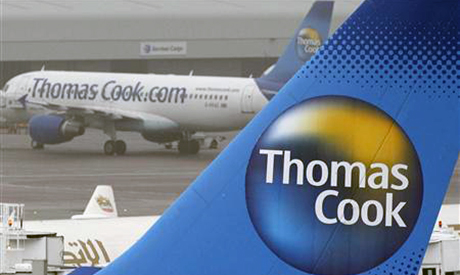
Thomas Cook aircraft (Photo: Reuters)
Shares in holiday companies Thomas Cook and TUI Group fell on Thursday after Britain suspended flights to a major Egyptian tourist resort, potentially hitting demand for holidays throughout Egypt.
Britain said on Wednesday it believed there was a significant possibility that an explosive device caused a Russian plane to crash in Egypt on 31 October, killing all 224 people onboard. As a result, Britain advised against travel through the Red Sea resort of Sharm El-Sheikh.
Shares in Thomas Cook fell 6.7 percent to 112.9 pence by midday, while TUI lost 1 percent to 1,150 pence on the anticipated hit to their businesses.
British travel association ABTA estimated there were about 9,000 customers currently on holiday in Sharm, plus an unknown number of holidaymakers who had travelled there independently.
Thomas Cook and TUI, Europe's two biggest holiday companies, said in statements they had cancelled all flights and holidays from Britain to Sharm El-Sheikh, a popular destination for Northern Europeans seeking winter sun, up until 12 November.
Both companies said customers who had booked to go during that time would be refunded.
Setback
The UK flight ban is the latest knock to Egypt's tourist industry, which has been trying to recover from four years of political upheaval and militant violence which has resulted in a string of holidaymaker deaths.
Given the safety warnings, Western European holiday companies are much less exposed to Egypt than they were before the overthrow of Hosni Mubarak in 2011.
Shore Capital analyst Greg Johnson estimated that holidays to Egypt accounted for about 3 percent of both of Thomas Cook and TUI's tour operator businesses, which in turn account for the bulk of overall group sales.
"We've seen Egypt as a proportion of business has more than halved in the last few years. They have taken a lot of capacity out of Egypt as demand has fallen," he said.
The number of tourists visiting Egypt has fallen from about 14.7 million in 2010 to a current level of around 10 million, according to Egyptian tourism ministry figures.
There were 1 million arrivals from Britain in 2014, according to data from Euromonitor, whose analyst Nadejda Popova said that while Egyptian tourism had a history of recovering from security crises, such as the bombings in Sharm in 2005, Britain's move would hurt the industry.
"The decision of the UK is going to have a very serious impact on the local economy and of course on tourism, as the only pockets of safety in the country in terms of tourism are now compromised," she said.
Before the Russian plane crashed, the latest setback to Egyptian tourism was in September when Egyptian security forces mistakenly bombed a convoy of Mexican tourists while pursuing militants. Eight Mexicans and four Egyptians were killed.
Trouble elsewhere in North Africa this year includes a beach massacre in Tunisia, when 38 people were killed in June, forcing Thomas Cook and TUI to cancel holidays, costing them 25 million pounds and up to 40 million euros respectively.
Thomas Cook, which operates with lower profit margins than bigger rival TUI, had said in September it was hoping for a pick-up in demand for holidays to Egypt. In July, it said a drop in bookings to Greece and Tunisia and the depreciation of the euro would knock its annual profits in the period. Its shares have fallen 4 percent since July 30.
TUI, whose shares have risen 9.6 percent in the last three months, has forecast its annual earnings to rise between 12.5 and 15 percent for the financial year-ended Sept.30.
British low-cost airline easyJet said it cancelled five flights to Sharm from Britain on Thursday.
Short link: